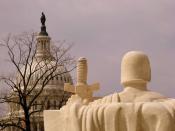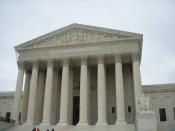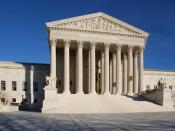The U.S. Constitution is one of the most influential documents in existence, considered by some to be a living document. The U.S. Constitution is one of the oldest surviving constitutions and accompanied with its amendments known as the Bill of Rights has been used by many countries around the world as a model when constructing their own constitutions. For over 200 years the U.S. Constitution and amendments have remained virtually unchanged. The Supreme Court of the United States must continually interpret the Constitution to reflect today's rapidly changing world. One of the most often heard debates is over freedom of speech.
Freedom of speech is given to citizens of the United States by the First Amendment of the Constitution. "Congress shall make no law respecting an establishment of religion, or prohibiting the free exercise thereof; or abridging the freedom of speech, or of the press; or the right of the people peaceably to assemble, and to petition the Government for a redress of grievances" (First Amendment - Religion and Expression, 2008).
Despite being granted, freedom of speech there are limits and restrictions for example, content based restriction. Justice Holmes wrote: "The most stringent protection of free speech would not protect man in falsely shouting fire in a theater and causing a panic" (Cohen, 2008).
Commercial speech mainly in the media of advertising is not given the full protection of the First Amendment, but does receive some protection. "Commercial speech is "speech that proposes a commercial transaction" (Cohen, 2008).
The First Amendment protects commercial speech that is not misleading or false as well as does not advertise a harmful or criminal activity. (Freedom of Speech - Commercial Speech, 2008).
In November 2004 Jeremy Jaynes was convicted on felony charges of using false internet protocol (IP) addresses to send mass email...



Freedom of speech good point
the essay is very good. as was mention freedom of speech is a civil right but we do have limits that very true. the essay have has great points
0 out of 0 people found this comment useful.